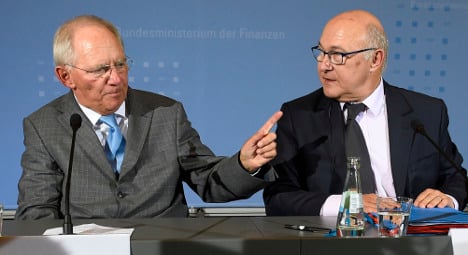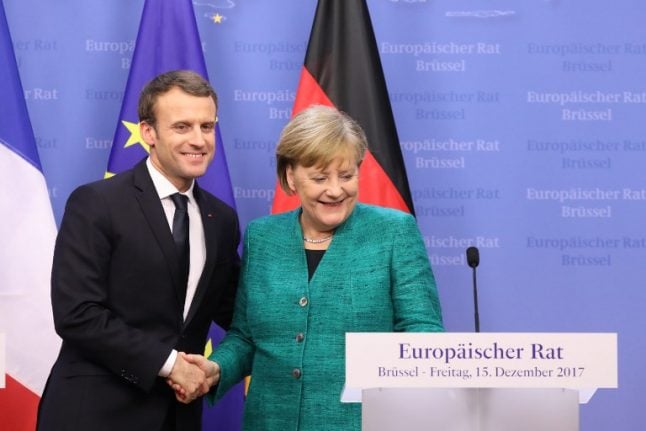France and Germany, the eurozone's two biggest economies, promised on Monday to do what was needed to boost investment in the single currency area at a time when the region's economy is flagging badly.
"We agreed to draw up a joint paper by the time of the next Franco-German economic council, which will contain the investment possibilities in both countries and our joint vision of Europe," German Finance Minister Wolfgang Schaeuble said.
He was speaking at a joint news conference with his Economy Minister Sigmar Gabriel and their French counterparts, Michel Sapin and Emmanuel Macron, following a mini-summit in Berlin.
The next Franco-German council will meet on December 1.
Monday's meeting came at a crucial time for Paris, which is at loggerheads with Brussels over its 2015 budget as it is likely to overshoot EU debt targets once again.
According to a report in the weekly Der Spiegel, Germany is helping France to draw up a pact with the European Commission on deficit reduction and structural reforms to win Brussels' approval of the 2015 budget plans.
France believes that Germany could help the eurozone's stalling economy by loosening its purse strings and increasing investment to match the savings Paris is seeking to make in public spending.
"Fifty billion euros savings for us and 50 billion of additional investment by you – that would be a good balance," Macron had told the Frankfurter Allgemeine Zeitung.
"It's in our collective interest that Germany invests."
At the news conference, Macron said €50 billion ($64 billion) was the figure Germany could afford to invest without jeopardising its budget.
Both Schaeuble and Gabriel made it clear that while they did not dispute the figure, most of that investment should come from private rather than public funds.
German growth engine stalls
Recent data has suggested that the German economy — traditionally Europe's growth engine — is stalling, threatening to pull the eurozone back into recession and put the brakes on the global recovery.
France, grappling with sky-high unemployment and a ballooning budget deficit, has been spearheading a campaign for Germany to soften its stance on fiscal austerity.
But Berlin remains adamant that the only way out of crisis is for eurozone countries to get their finances in order by sticking to agreed rules on the size of their deficits.
Asked by the daily Bild whether Europe should abandon the path of austerity, German Economy Minister Gabriel said: "No.
"But the money we spend on Europe can be put to better use – for investment in research and development, in a fast Internet and in saving energy," he conceded.
All four ministers denied that with the joint paper to be presented in December, the eurozone's two biggest economies were seeking to strike some sort of deal.
"I haven't asked anything of Germany," said Macron.
"Everyone must do what do what needs to be done," but added: "It is true that Germany has more room than we do to boost investment."
French Finance Minister Sapin also refuted that any deal was on the table.
"There is no pact. We're not looking for a pact. We're looking for everyone to take their responsibilities," he said.
The ministries of Sapin and Schaeuble have been working for weeks now on various investment proposals. The efforts of the eurozone's two largest economies will flank similar efforts made at a European level, with the new EU Commission also keen to boost investment.
The Franco-German effort "will create momentum which will be beneficial to everyone in Europe," said Sapin.



 Please whitelist us to continue reading.
Please whitelist us to continue reading.
Member comments